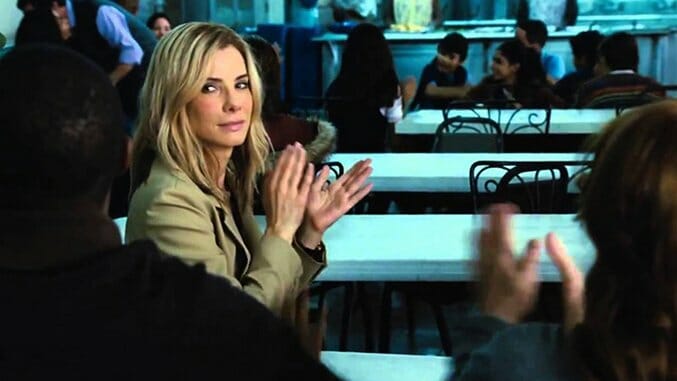Our Brand Is Crisis

Midway through Our Brand Is Crisis, political strategist Jane Bodine (Sandra Bullock), stationed in Bolivia to help with a presidential election, throws away years of sobriety and gets drunk in order to celebrate a minor campaign victory. That revelry, full of shots, weed and puffs from an Oxygen tank, soon leads to copious hotel room service and using a bra to slingshot crap at the window of the room of her rival, Pat Candy (Billy Bob Thornton). An interlude of go-for-broke goofiness, it’s the one moment in the film that actually feels like the former work of its director, Pineapple Express and Your Highness director David Gordon Green. It’s also, ultimately, the only passage during which this wishy-washy political satire doesn’t bog down in bland humor or have-it-both-ways moralizing.
Fictionalizing Rachel Boynton’s acclaimed 2005 documentary of the same name (the credits say it’s “suggested” by that non-fiction predecessor), Our Brand of Crisis situates itself in present-day Bolivia, where presidential candidate Rivera (Louis Arcella) is winning in the polls thanks to his grassroots appeal to the country’s indigenous majority. As a famed consultant, dubbed “Calamity Jane” for her notorious public missteps, Jane is enlisted by Ben (Anthony Mackie) and Nell (Ann Dowd) to help revitalize the flagging campaign of Castillo (Joaquim de Almeida), a man who held the country’s highest seat fifteen years earlier – and presided over some ill-defined massacre of innocents. Castillo now hopelessly trails Rivera because he’s viewed as a corporate lackey in thrall to big business and the IMF.
Written by Peter Straughan, Our Brand Is Crisis sets its comedic tone early, when Jane arrives in the country and finds herself beset by altitude sickness that causes her to puke in a garbage can during her first meeting with Castillo, and subsequently carry around a bag of chips to help stave off nausea. Like those early bits, most of the film’s gags are flat and lifeless, lowlighted by a scene in which a llama procured for one of Castillo’s TV commercials abruptly runs out into the street and is run over by a passing car. Far better are the barbs tossed between Jane and her lifelong professional rival Candy, who’s running Rivera’s operation, and who speaks in that low, southern-twangy Thornton voice that allows caustic insults and threats to emerge, like molasses, from seemingly cordial conversation. When Thornton refers to his “Mephistophelean ways,” the commingling of menace and self-deprecating absurdity is just about perfect.
-

-

-

-

-

-

-

-

-

-

-

-

-

-

-

-

-

-

-

-

-

-

-

-

-

-

-

-

-

-

-

-

-

-

-

-

-

-

-

-








































